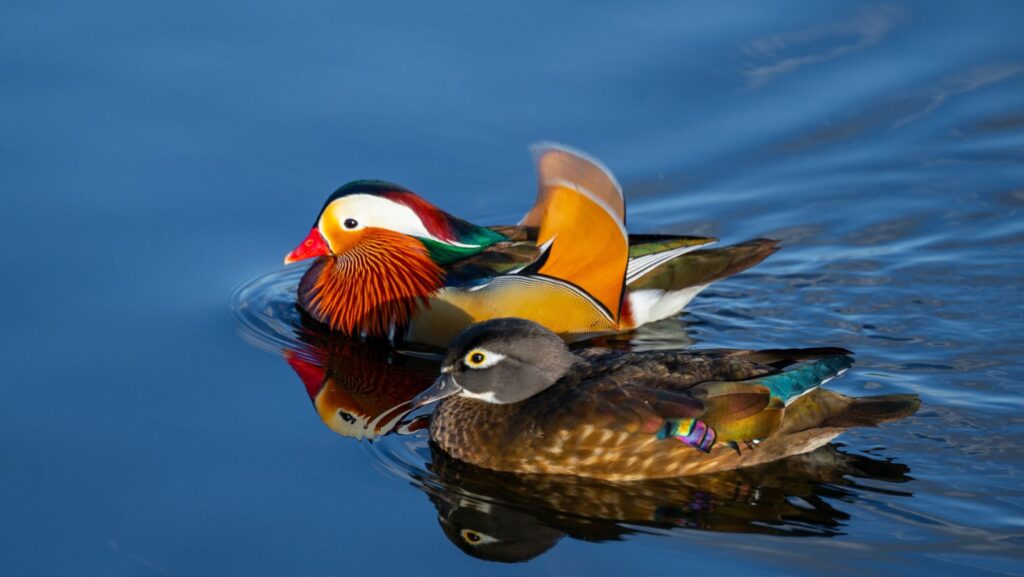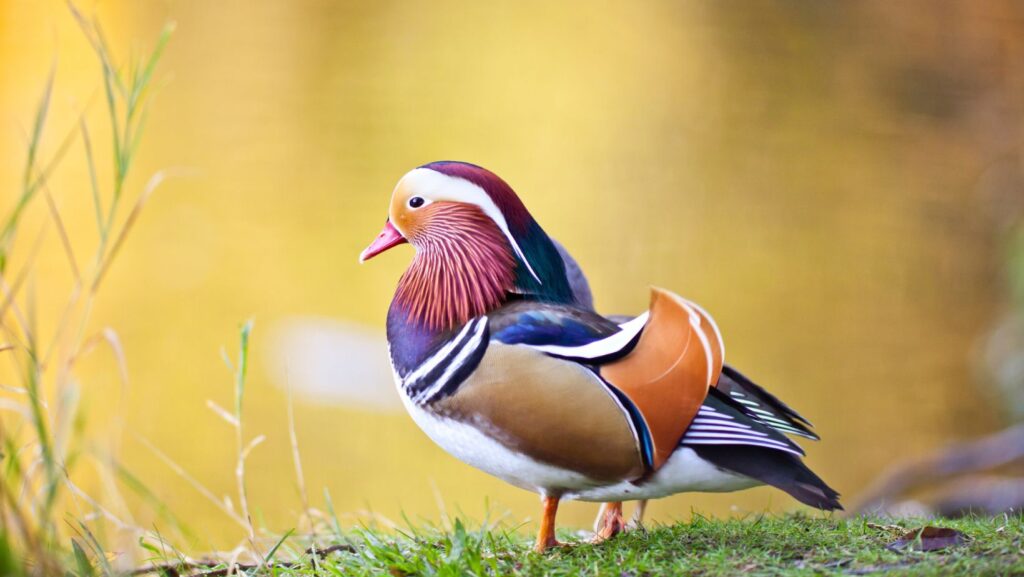The mandarin duck is a small and colorful duck species that originates from East Asia. Known for its vibrant plumage, the mandarin duck is a stunning bird with a rich cultural significance in countries like China, Japan, and Korea. While its name is Chinese, this beautiful waterfowl has captivated people around the world and can now be found in various regions thanks to the establishment of colonies by travelers in the 19th century. With its unique appearance and symbolic meaning, the mandarin duck has become a beloved and iconic species that fascinates both bird enthusiasts and admirers of its cultural heritage.
The IUCN Status of the Mandarin Duck
The mandarin duck (Aix galericulata) is classified under the International Union for Conservation of Nature (IUCN) as a species of “Least Concern.” This designation implies that the mandarin duck’s population is relatively stable and not currently facing significant threats or conservation concerns on a global scale.
However, it is important to note that local populations and habitats may still face specific challenges and conservation efforts are necessary to ensure their long-term survival. Monitoring and conservation initiatives are essential to maintain the favorable status of the mandarin duck and protect its habitats in different regions.
Are Mandarin Ducks Exotic?
Mandarin ducks are considered exotic in many regions outside their natural range. They are native to East Asia, including China, Japan, and Russia. Due to their striking appearance, Mandarin ducks have been introduced to various parts of the world as ornamental waterfowl in parks, gardens, and private collections.

Can You Keep Mandarin Ducks as Pets?
Keeping Mandarin ducks as pets may be possible under certain circumstances and with proper permits, depending on local regulations. However, it is important to note that Mandarin ducks have specific needs in terms of habitat, diet, socialization, and care.
They require ample space, access to water for swimming, and a suitable environment that replicates their natural habitat. It is recommended to consult with avian experts or organizations familiar with Mandarin duck care before considering them as pets.
Can You Shoot Mandarin Ducks in the USA?
No, shooting Mandarin ducks in the United States is generally not allowed. Mandarin ducks are classified as non-native species and are protected under the Migratory Bird Treaty Act (MBTA) and various state laws.
In the United States, hunting of mandarin ducks is not allowed as they are non-native to the country and not classified as a game species. The U.S. Fish and Wildlife Service has specific regulations regarding the hunting of migratory birds, and mandarin ducks are not included in the list of approved game species for hunting. It is important to follow these regulations and respect the laws in place to protect wildlife populations and preserve their natural habitats.
The MBTA prohibits the hunting, capture, possession, or harm of migratory birds, including Mandarin ducks, without the appropriate permits and licenses. Violations of the MBTA can result in severe penalties, including fines and imprisonment.
Can You Shoot Mandarin Duck in the UK?
In the UK, shooting Mandarin ducks is generally not permitted. Mandarin ducks are protected under the Wildlife and Countryside Act 1981, which makes it illegal to intentionally kill, injure, or take them without a specific license or permit. The law aims to protect native and non-native species and prevent harm to their populations.

Where Is It Legal to Shoot or Hunt Mandarin Ducks?
As previously mentioned, shooting or hunting Mandarin ducks is generally prohibited in most regions. However, specific regulations and exceptions may exist in certain areas or under specific circumstances. It is crucial to consult the local hunting regulations and wildlife management agencies in the country or region where you are located to obtain accurate and up-to-date information regarding hunting opportunities for Mandarin ducks.
7 Alternatives to Hunting Mandarin Ducks:
Instead of hunting Mandarin ducks, there are alternative ways to appreciate and observe these beautiful birds. Many wildlife sanctuaries, nature reserves, and parks provide opportunities for birdwatching and observing waterfowl in their natural habitats. You can Also, Read Free eBooks Moreover, If you want to learn more about Mandarin ducks there are countless books with great information! and This allows for a non-consumptive and conservation-focused approach to enjoying Mandarin ducks and other bird species.
When it comes to hunting alternatives to Mandarin ducks, there are various game species that are legally hunted in different regions. Here are some examples:
- Upland Birds: Species like pheasants, quails, grouse, and partridges are popular game birds for hunting. They provide challenging hunts in a variety of landscapes, such as fields, forests, and grasslands.
- Waterfowl: Ducks and geese are commonly hunted waterfowl species. Different species of ducks, such as mallards, teal, and pintails, provide exciting hunting opportunities in wetlands, marshes, and lakes.
- Deer: Whitetail deer, mule deer, and other deer species are highly sought after by hunters. Deer hunting is popular in many regions and offers opportunities for both firearms and archery hunting.
- Wild Turkey: Hunting wild turkeys is a popular pursuit, especially during the spring turkey season. It requires patience, calling skills, and camouflage techniques.
- Upland Game: Depending on the region, upland game species like rabbits, squirrels, and hares may be legal to hunt. They provide challenging hunts and are often pursued with hunting dogs.
- Big Game: Big game species like elk, moose, bear, and wild boar offer thrilling and rewarding hunting experiences. These hunts typically require specialized permits and may have specific hunting seasons and regulations.
- Small Game: Various small game species, including rabbits, squirrels, and game birds like doves and pigeons, can be legally hunted in certain regions. They offer opportunities for skill development and enjoyable hunting experiences.
It is important to note that hunting regulations vary by location, and it is crucial to familiarize yourself with local laws, obtain the necessary licenses and permits, and adhere to ethical hunting practices. Additionally, conservation efforts and sustainable hunting practices should always be prioritized to ensure the long-term viability of wildlife populations.

Impacts of Shooting on Mandarin Duck Populations:
The impacts of shooting on Mandarin duck populations can be significant. Excessive hunting pressure can lead to population declines, disrupt breeding patterns, and negatively affect the overall sustainability of the species. Given their conservation status and the need to protect their populations, it is important to prioritize the conservation and responsible management of Mandarin ducks rather than shooting or hunting them.
It is essential to respect and abide by the laws and regulations in place to ensure the long-term survival and well-being of Mandarin ducks and other waterfowl species.
20 Amazing Mandarin Duck Facts You Must Know
Certainly! Here are 20 fascinating facts about Mandarin ducks:
- Mandarin ducks are small to medium-sized ducks belonging to the family Anatidae.
- They are native to East Asia and are particularly prominent in China, Japan, and Russia.
- Mandarin ducks are known for their striking and vibrant plumage, with males displaying a colorful combination of red, orange, purple, blue, green, and white feathers.
- In contrast, female Mandarin ducks have more subdued plumage, featuring shades of brown, gray, and white, which helps them blend into their surroundings during nesting.
- These ducks are monogamous and form strong pair bonds, remaining together for life.
- Mandarin ducks are highly territorial during the breeding season and defend their nesting sites vigorously.
- They prefer to nest in tree cavities, especially those near water bodies, using natural tree holes or old woodpecker nests.
- Mandarin ducks are adept climbers and can use their sharp claws to ascend trees and reach suitable nest sites.
- The female incubates the eggs for about 28-30 days, during which time the male stays close by and provides protection.
- Once hatched, the ducklings leave the nest within a day and jump down from the tree, guided by their mother’s calls.
- Mandarin ducks are primarily vegetarian, feeding on seeds, grains, fruits, and aquatic plants. However, they also consume small insects, snails, and occasionally small fish.
- They have a unique feeding behavior known as “dabbling,” where they tip their heads underwater while keeping their tails raised.
- Mandarin ducks have strong wings and are excellent fliers. They can fly swiftly through forests and over bodies of water.
- While they are primarily silent, Mandarin ducks produce soft calls and whistles, especially during courtship and territorial displays.
- These ducks are culturally significant in East Asian countries, symbolizing love, fidelity, and marital bliss. They are often featured in traditional artwork, including paintings, ceramics, and textiles.
- Mandarin ducks have been introduced to various parts of the world, including Europe, North America, and Australia, where they have established small populations.
- In the wild, Mandarin ducks face threats from habitat loss, pollution, predation, and hunting.
- They are listed as a species of “least concern” on the International Union for Conservation of Nature (IUCN) Red List, indicating they are not currently at risk of extinction.
- Mandarin ducks are popular attractions in zoos, parks, and wildlife reserves, where visitors can observe their stunning beauty and behavior.
- They are considered one of the most beautiful ducks in the world and are admired for their graceful appearance and colorful plumage.
These are just a few of the many intriguing facts about Mandarin ducks, highlighting their uniqueness and significance in the natural world.
USA States Where Can You Hunt Ducks?
Duck hunting is a popular activity in various states across the United States. While specific regulations and seasons may vary from year to year, here are some states known for their opportunities to hunt ducks:
- Arkansas: Known as the “Duck Capital of the World,” Arkansas offers excellent duck hunting opportunities. The state is home to numerous public hunting areas, including wildlife management areas and national wildlife refuges, where hunters can pursue various duck species.
- Louisiana: Louisiana’s extensive wetlands and marshes provide prime habitat for ducks. The state offers diverse hunting opportunities, with public lands, private leases, and guided hunts available. Popular hunting areas include the Atchafalaya Basin, Catahoula Lake, and the Mississippi River Delta.
- Texas: Texas is a renowned destination for waterfowl hunting, with both coastal and inland hunting opportunities. The state offers public hunting lands, state parks, and private hunting leases where hunters can pursue ducks.
- Mississippi: Mississippi is known for its productive waterfowl habitats, including rivers, lakes, and coastal marshes. The state offers public hunting areas and private hunting clubs where hunters can target various duck species.
- California: California provides diverse hunting opportunities, with both migratory and resident duck populations. The state offers public hunting areas, wildlife management areas, and private hunting clubs along its coastal regions, wetlands, and agricultural areas.
- Missouri: Missouri is renowned for its wetlands and river systems, attracting a significant number of migrating ducks. The state offers public hunting lands, conservation areas, and managed wetlands for duck hunting.
- North Dakota: North Dakota’s prairie pothole region serves as a crucial breeding ground for ducks. The state offers public hunting lands, including wildlife management areas and federal waterfowl production areas, where hunters can target waterfowl species during the fall migration.
- Minnesota: With its numerous lakes, rivers, and wetlands, Minnesota offers diverse waterfowl hunting opportunities. The state provides public hunting lands, wildlife management areas, and state forests where hunters can pursue ducks.
Summary
These are just a few examples of states known for their duck hunting opportunities. However, it’s important to check the current hunting regulations and seasons specific to each state, as they can vary from year to year. Additionally, obtaining the necessary licenses and permits is essential to ensure compliance with local laws and regulations.

Hi, There and Welcome to BirdsNews.com, is here to help you learn and care about pet birds. and this blog is a journal of everything I’ve learned.








